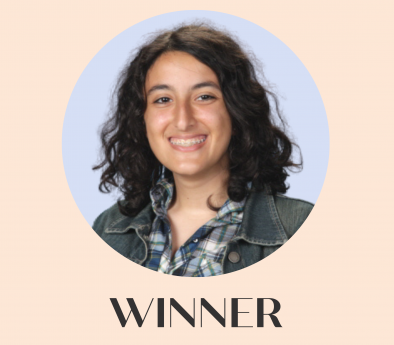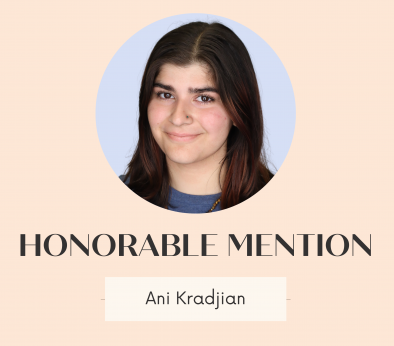Collaborations
Creative and passionate—working hand-in-hand
Photo credit: Norayr Kasper, "Residues of a Slogan." Fotoistanbul 2015.Join our community and receive regular updates!
Join now!Any additional references or recommendations? We would love to hear your suggestions!
Send a message
Poem | home is a peanut butter and jelly sandwich on lavash bread by YAPA 2024 Winner Hasmik Tumasyan
Read "home is a peanut butter and jelly sandwich on lavash bread" by YAPA 2024 Winner Hasmik Tumasyan, a 17-year-old Armenian-American writer from Southern California, with commentary from YAPA Judge Raffie Joe Wartanian.
New


IALA x h-pem | In Memory of the Country We Once Recalled
What happens to our connection with a home after we have left? This question haunts the elegiac explorations of “In Memory of the Country We Once Recalled.” Bookended by a dialogic line of longing—“You haven’t returned home in years”—the poem explores the meaning of a home laced with loss and love. The idea of home is, in this case, Armenia, yet the poet’s specific rendering of that home points to universal tensions relatable to anyone who has ventured toward unknowns. Whether in a new town, state, or country, there looms the inescapable shadows of the past—the people, the places, the possibilities—that facilitated leaving and establishing a new home where traces of the old echo. If home is the lingering shadow, then we’re inspired to ask: What does home even mean? Perhaps it’s a history to preserve, or a prison of paralyzing nostalgia, or something between those polarities. In the Armenian experience of countless migratory waves, definitions of home face assimilation pressures in the new setting. “And somehow, in our youthful innocence,” the poet observes, “we / replaced culture with rapture / Baklava and lahmajoun morphing all too quickly / into cupcakes and Domino’s Pizza.” Cuisine is not the only cultural idiom distorted by the dynamics of migration. Annual visits to Armenia render the homeland a mere “tourist destination,” where the mayrenik is “Straining under the weight of a new, more developed, homeland.” As a painter layers color, here the poet layers identity with “homeland” as a term both firm yet fluid, as something that can be layered, mixed, and morphed by forces beyond one’s control. Through cuisine and tourism, the poem builds to a striking moment where the desire and need to assimilate cannot escape the internalizing of cultural erasure. Writes the poet: “We ask / mama and papa to ‘please speak in English / when my friends are here’ So that our cheeks don’t blush / pomegranate red in humiliation.” This line shows the poet’s powerful capacity to confront efforts to conform with a dominant culture that simultaneously reveal an inner “pomegranate red” essence that no amount of assimilation can erase. We do not know why the person with whom the poet converses, presumably the poet’s mother, left Armenia, or what economic hardships, political pressures, or regional conflicts she sought to escape. Her disconnect—physicalized with “lips recoiling, disgusted,”—point to a justifiable need to let go of what was in order to embrace what is and what can be. And yet for the youth, like the poet, caught in such calculations, these lines of separation are hazy. In this obscure space, the poet mines the riches of these tensions, using the pen to stake a compelling claim: “my home is no longer hers.”
Commentary provided by YAPA contest judge Raffi Joe Wartanian
New


IALA x h-pem | my letter to the missed armenian
“my letter to the missed armenian” is a moving elegy for a fallen Armenian soldier, maybe during the Artsakh conflict, whose slow dissolution moves the speaker toward lamentation. It is a gravepoem, a poem that describes how death unloosens the body bit by bit into disappearance. Impressively, the poem’s structure magnifies our perception of an impending absence. The large blank spaces that surround the poem and migrate into it, the gaps already floating inside some of the lines, the lack of punctuation and strict margins, all add to our sense of an emptiness taking hold. It’s as if the poem itself were dissipating, though not before startling us with its imagery and phrasing and heightening the possibilities of language. How unusual it is to describe a bloody death as “red ink” written on the grass; no one, perhaps, has described war as a “taunt ill”; and in one of the best passages of the poem, the speaker’s willingness to sacralize the soldier’s death takes an incantatory tone: “i’ll / sing your fingerprints / i’ll / publish a common book / and control the blasts of / blanched clouds.” It is a poem that locates the departures and absences that Armenians have historically endured squarely in the death of one Armenian soldier, the all residing in the one, the past merging into the present. Finally, this empathic communion between the then and the now which the speaker feels on the skin gives the poem a final hopeful tone: that the body returning to the earth seeds it for a second renewal, and all that has been left unsaid might appear again like a new flowering of words on the tongue.
Commentary provided by YAPA contest judge Gregory Djanikian.
New


IALA x h-pem | The Once-Man
What Taleen Sahakian does with imagery is astounding. In her poem, "The Once-Man," the reader is introduced to a mysterious creature with a cryptic message. What at first seems like a fantasy tale about an imaginary beast turns into a parable about an act of violence so deplorable, it burns "all the love in the world to the ground." The Once-Man is a symbol of loss in its most profound form, in the form of mass annihilation of a group of people. Sahakian alludes to our history, highlights the terrors our ancestors experienced but also reminds us of the power of storytelling. This poem comes from an imaginative mind, a curious soul and a lover of symbolism. Ms. Sahakian succeeds in creating an unforgettable character in The Once-Man.
Commentary provided by YAPA contest judge Armine Iknadossian

IALA x h-pem | Introducing...the 2021 Young Armenian Poets Awards
At h-pem we are thrilled to finally share the results of IALA’s (International Armenian Literary Alliance) Young Armenian Poets Awards!
Huge congratulations to the following poets (Listed in alphabetical order), whose works have been selected by IALA’s exceptional judges, as the winners and honorable mention for the 2021 poetry contest.
Sarkis Anthony Antonyan: “I Meet the Gravedigger Burying a Soldier from Artsakh”
Sofia Demirdjian-Lara: “I See You in the Jacarandas”
Lucine Ekizian: “Go Light on the Sweetness”
Natalie Abadjian: “o white” (Honorable mention)
We are proud to host the special publication of your work on our website!
Thanks to IALA’s vision, you can now add a new feather to your creative accomplishments and develop your potential for lasting fulfillment. Through your originality and creativity, you have each made a significant contribution to raising awareness about the undercurrents and connections that join us as Armenians.
“If poetry can reveal the heart of a people, then poetry written by some of the youngest amongst us can present that heart in the most honest and unadulterated way,” writes IALA Advisory Board Member Alan Semerdjian.
Enjoy Semerdjian’s unique window into the world seen through the eyes of IALA’s young contestants, then check out their winning entries by following the links at the bottom.
We hope our IALA x h-pem collaboration inspires readers to appreciate and care for fledgling poets — they invite us all to reconnect with the parameters of identity and belonging that sustain and surround us, each in their own personal and thoughtful approach.

IALA x h-pem | I meet the gravedigger burying a soldier from Artsakh
“I Meet the Gravedigger Burying a Soldier from Artsakh" is a moving lament for a soldier who has died in the Artsakh conflict. Its power comes from the poet’s delicate handling of language, phrasing, an eschewal of hyperbole. One of the most striking images describes the speaker’s yearning to give the ability of speech back to the stricken warrior: "How is this the resolution of/an incomplete history? I have removed my voice box/and placed it/on your heart." It depicts a poignant communitarian gesture, a giving to the lifeless body a voice, a continued narrative. Also impressive are the opening lines of the poem which describe the speaker’s willingness to shield the fallen soldier by metaphorically staving off what will disturb him: “Please, let me swallow the rain/to save this soil. He needs a good home, a dry cavern/to sleep.” And finally, the tone of the poem, the understatement, the delicacy of utterance, indicts the ravages of war itself without diatribe or homily.
Commentary provided by YAPA contest judge Gregory Djanikian

IALA x h-pem | I see you in the jacarandas
The power and lift of this moving poem built off of a meditation on a Jacaranda Tree, as noted in its title, seem to come from the writer’s ability to risk sentimentality without being sentimental while simultaneously pushing abstraction without alienating the reader. We’re told the examination of the lost loved one in the poem, as brought on by the proximity of the tree, transports the speaker into “the closet of a dream” where “I am a bird / In another life / By your side.” Like William Carlos Williams’ lengthier “Asphodel” and H.D. 's more economical “Pear Tree,” the work is deftly sewn together both imagistically and musically and spins the initial conceit to welcome in a multitude of concerns. It has much to say about the nature of longing and loss, two notions that feel, acutely, Armenian and also indicative of the human condition. This is a terrifically-crafted achievement of the imagination.
Commentary provided by YAPA judging director Alan Semerdjian.

